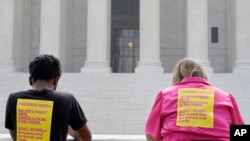The Supreme Court justices ruled against Biden in a 6-3 decision favoring six conservative-leaning states that objected to the policy. The court's action dealt blow to the 26 million U.S. borrowers who applied for relief after Biden announced the plan in August 2022 and a political setback for the Democratic president.
Conservative Chief Justice John Roberts, joined by the rest of the court's conservative members, wrote the ruling over a dissent from the court's three liberals.
"From a few narrowly delineated situations specified by Congress, the secretary has expanded forgiveness to nearly every borrower in the country," Roberts said, referring to the U.S. education secretary.
Under the plan now ruled out, the U.S. government would have forgiven up to $10,000 in federal student debt for Americans making under $125,000 who obtained loans to pay for college and other post-secondary education and $20,000 for recipients of Pell grants to students from lower-income families.
Arkansas, Iowa, Kansas, Missouri, Nebraska and South Carolina challenged Biden's debt relief. Two individual borrowers had also opposed the plan's eligibility requirements but the justices dismissed their challenge on Friday due to a lack of legal standing. The court acted on its final day of rulings in its term that began in October, 2022.
During February arguments in the loans case, Biden's administration said the plan was authorized under a 2003 federal law called the Higher Education Relief Opportunities for Students Act, or HEROES Act, which empowers the U.S. education secretary to "waive or modify" student financial assistance during war or national emergencies.
Roberts in Friday's ruling derided the administration's argument that the loan forgiveness program was merely a modification.
"The secretary's plan has 'modified' the cited provisions only in the same sense that the French Revolution 'modified' the status of the French nobility' - it has abolished them and supplanted them with a new regime entirely," Roberts wrote.
During the arguments, a Justice Department lawyer portrayed the debt relief as a benefits program rather than an assertion of regulatory power not authorized by Congress.
In response to the legal challenge brought by the states, a federal judge in Missouri in October 2022 ruled that they lacked the legal standing to sue. On appeal, the St. Louis-based 8th U.S. Circuit Court of Appeals found that at least one of the states, Missouri, had proper standing.
In the case brought by individual borrowers named Myra Brown and Alexander Taylor, a federal judge in Texas ruled in November 2022 that the plan exceeded the Biden administration's authority - a ruling that the New Orleans-based 5th U.S. Circuit Court of Appeals declined to put on hold pending appeal.
Biden's plan fulfilled his 2020 campaign promise to cancel a portion of $1.6 trillion in federal student loan debt but was criticized by Republicans who called it an overreach of his authority and an unfair benefit to college-educated borrowers while other borrowers received no such relief.













Forum